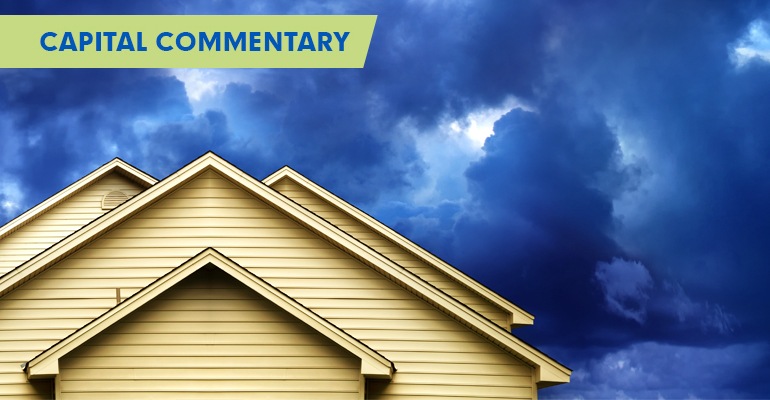
“Neither snow nor rain nor heat nor gloom of night stays these couriers from the swift completion of their appointed rounds.”
The U.S. Postal Service’s motto
Your mail might arrive on time, but weather catastrophes might also raise your homeowners insurance premiums or, worse yet, cause your policy to be canceled.
In this issue, Capital Commentary offers a primer on the ongoing property insurance crisis facing homeowners and insurers, alike.
A future issue will cover potential solutions.
1. Insurers’ Costs Are Soaring
Depending on who is doing the talking, the reasons homeowners insurance is more costly or less available are regulatory restrictions, climate change or a litigious environment.
Why it matters: According to the National Oceanic and Atmospheric Administration (NOAA), since the beginning of the year the country has experienced 15 weather disasters, each resulting in losses of more than $1 billion.
Here is what everyone agrees on: Costs are rising for both insurers and homeowners. Those higher costs are causing insurers to abandon certain states, imperiling homeowners and putting some loan originations in a deep freeze.
- U.S. insurers have disbursed $295.8 billion in natural disaster claims over the past three years, according to the American Property Casualty Insurance Association (APCIA).
- In 2022, property and casualty insurers recorded a $26.5 billion net underwriting loss.
The bottom line: Affordable housing is increasingly at risk without a solution to the homeowners insurance crisis.
2. Consumer Premiums Skyrocket While Choices Plummet
Homeowners insurance premiums in the U.S. increased an average of 21% nationally from May 2022 to May 2023, according to Policygenius, an online tool for insurance shopping. Leading the way:
- Florida, up 35%.
- Idaho, up 31%.
- Colorado, up 30%.
More (depressing) numbers:
- In Florida, at least 15 companies have stopped writing homeowners insurance policies.
- In Louisiana, about a dozen insurers have pulled out since hurricanes Laura, Delta and Zeta in 2020 and Ida in 2021.
- In California, eight companies left the homeowners insurance market, largely due to wildfire risk.
Losses and higher prices are spreading to the reinsurance industry, too. Reinsurance companies are the insurance industry’s insurers.
What they’re saying:
“If reinsurers are having doubts about coverage, it’s clear the entire insurance industry faces extraordinary challenges that could be catastrophic, particularly for disaster-prone areas … Too many state leaders [are fiddling] while their states burn or flood.”
Linda Stamato, Policy Fellow, New Jersey State Policy Lab.
3. U.S. Senate Looks for Answers
The U.S. Senate Banking Committee held a recent hearing on the challenges in the property insurance market and its impact on consumers. Industry lobbyists, consumer advocates and a conservative think tank all weighed in.
In his opening statement, Senate Banking Committee Chair Sherrod Brown, D-Ohio, tallied the costs of recent natural disasters:
- $34 billion in insured losses over the first half of 2023 due to storms.
- $6 billion in losses due to the wildfires in Maui.
- Upwards of $20 billion in expected losses in Florida, Georgia and the Carolinas due to Hurricane Idalia.
Brown noted that even with the average annual homeowners insurance premium topping $6,000 in Florida, fourteen insurance companies have either left the state or have entered the receivership process.” He asked hearing witnesses to shed some light on the issue.
What they’re saying:
The Insurance Trade Groups:
“When policymakers restrict insurance rates and prevent insurers from setting rates commensurate with the expected losses, it masks the true costs, further exacerbating property losses and damages while creating availability issues for individual and business insurance consumers.”
– Joint testimony of insurance trades APCIA and the Reinsurance Association of America (RAA)
The Consumer Advocate:
“In 2022, Americans spent about $125 billion for [homeowners insurance]. It’s rising about 40% faster than inflation since 2017 … The neighborhoods most vulnerable to climate disasters are often home to communities of color and low-income Americans, amplifying the crisis for them.”
– Douglas Heller, Director of Insurance, Consumer Federation of America
The Think-Tank Analyst:
“In Florida, the [homeowners] insurance market was plagued by out-of-control meritless litigation. The magnitude of the litigation abuse problem is starkly visible in the statistic that Florida accounts for 9% of the nation’s [homeowners] insurance policies but is responsible for 79% of the entire country’s homeowner insurance litigation.”
– Jerry Theodorou, Director of the R Street Institute’s Finance, Insurance and Trade program.
The bottom line: As private insurers have left the market, state-run programs become insurers of last resort. They, too, are struggling to contain costs.
- The public Florida Citizens plan is the state’s largest insurer with 1.4 million policies.
- California’s FAIR plan has seen a 100% increase in policies since 2018.
The big picture: It’s commendable that the Senate held a hearing on the crisis, but property insurance is regulated at the state, not federal, level. The solutions need to be found at the state level, likely including a combination of greater rate flexibility, tort reform and disaster-mitigation efforts (with discounts for homeowners who take steps to reduce the risk of loss).
What’s next: Capital Commentary will explore potential solutions in an upcoming issue.

About Arch MI’s Capital Commentary
Capital Commentary newsletter reports on the public policy issues shaping the housing industry’s future. Each issue presents insights from a team led by Kirk Willison.
About Arch MI’s PolicyCast
PolicyCast — a video podcast series hosted by Kirk Willison — enables mortgage professionals to keep on top of the issues shaping the future of housing and the new policy initiatives under consideration in Washington, D.C., the state capitals and the financial markets.
Stay Updated
Sign up to receive notifications of new Arch MI PolicyCast videos and Capital Commentary newsletters.